What's New
Displaying results 3011 - 3020 of 4922

Resource | Publications,
This paper provides an overview of how current drug policies affect human development, including UNDP's mandate and activities. It highlights opportunities for UNDP to address the development dimensions of drug policy in its programme and policy support to UN Member States as guided by our 2014-2017 Strategic Plan. The paper also addresses potential avenues for UNDP to promote the development dimensions of drug policy in international norm setting fora, including the post-2015 agenda and the preparations for UNGASS 2016. Ultimately, its is hoped that the paper will be used by UNDP and other stakeholders to support policies and programmes that contribute to better coherence between drug control policies and practices and development goals.

Resource | Fact Sheets,
380 new cases of human immunodeficiency virus (HIV) infections were reported among Singapore residents[1] in the first 10 months (January – October) of 2015. Of these, the Ministry of Health (MOH) has performed further analysis for 144 cases reported within the first 6 months (January – June) of 2015.
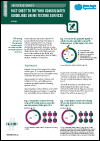
Resource | Fact Sheets,
Recent estimates report that only 54% of people with HIV know their HIV status. In order to reach the UN 90–90–90 goals it is critical that HIV testing services be strategically expanded to diagnose as many people with HIV as early as possible.
This fact sheet includes data on HIV testing services reported by countries to the Global AIDS Response Progress Reporting (GARPR) (WHO, UNAIDS, UNICEF) as of July 2015.
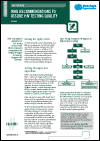
Resource | Publications,
New Consolidated guidelines on HIV testing services from WHO recommend standardized HIV testing strategies to correctly diagnose HIV infection.
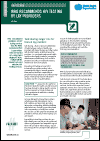
Resource | Publications,
New Consolidated guidelines on HIV testing services from the WHO recommend that lay providers who are trained can, using rapid diagnostic tests, independently conduct safe and effective HIV testing services.
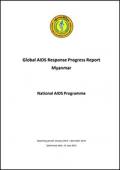
Resource | Publications,
The human immunodeficiency virus (HIV) epidemic in Myanmar is concentrated among men who have sex with men (MSM), people who inject drugs (PWID) and female sex workers (FSW). HIV prevalence in the adult population aged 15 years and older was estimated at 0.54% in 2014. But data from HIV Sentinel Sero-Surveillance (HSS) indicates higher prevalence in 2014 among key populations: FSW 6.3%, MSM 6.6% and PWID 23.1%. Compared to 2012 data, the prevalence has declined from 7.1% in FSW and 8.9% in MSM, but has increased from 18% in PWID.
An estimated 9,000 new infections occurred in 2014. Most HIV and AIDS cases are reported from large urban areas, and from the north-eastern and northern areas of the country where injecting drug use is widespread.
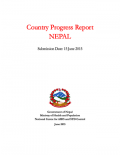
Resource | Publications,
The Ministry of Health and Population (MoHP) assigned its National Centre for AIDS and STD Control (NCASC) with the responsibility of leading the preparation and submission of the Nepal Country Progress Report 2014 in collaboration with technical partners and stakeholders for the Global AIDS Response Progress Reporting (GARPR).
In March 2015, the NCASC nominated the Strategic Information Technical Working Group as an Advisory Group (AG) for the preparation of the country progress report. At the same time, a Technical Working Team (TWT) was also formed with the responsibility of the actual preparation of the report. The road map for the Country AIDS Response Progress for the GARPR reporting was developed in consensus with the AG and TWT.
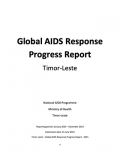
Resource | Publications,
Timor-Leste is still a low HIV prevalence country, where HIV prevalence of general population is well below 1%, while it is lower than 5% in any of the key population, including sex workers, men who have sex with men, and injecting drug users. There are areas and groups where the HIV epidemic is “concentrated”, however. This status has been determined from surveillance information, an integrated bio-behavioral survey (IBBS) in key populations (2011) and HIV sentinel surveillance undertaken in 2010 and 2013.

Resource | Videos,
An innovative community-based programme in Cambodia is bringing rapid HIV tests to communities who are often left behind. It trains entertainment workers and other key populations at higher risk of HIV to conduct HIV tests among their peers. The community led testing and counseling programme was introduced by the National Center for HIV/AIDS, Dermatology and STIs. Implementation is led by the Flagship Consortium Partners (KHANA, Family Health International 360 and Population Services Khmer) with direct implementation by the Cambodian Women for Peace and Development, Men's Health Social Services and Men's Health Cambodia with support from the US Government and the United Nations Population Fund.

Resource | Laws and Policies,
In support of the United Nation's Millennium Developtrieht Goal Number 6 to halt or reverse the incidence of Human Immuno-deficiency Virus (HIV)/Acquired Immune Deficiency Virus (AIDS) by 2015, PhilHealth through Board Resolution No. 1331, series of 2009 has approved the implementation of an outpatient HIV/AIDS treatment package. This benefit aims to increase the proportion of the population having·access to effective HIV/AIDS treatment and patient education measures.





